Using Your IRA to Buy Real Estate
There are other ways to invest in real estate in your IRA that won’t jeopardize your account’s tax-advantaged status.


Profit and prosper with the best of Kiplinger's advice on investing, taxes, retirement, personal finance and much more. Delivered daily. Enter your email in the box and click Sign Me Up.
You are now subscribed
Your newsletter sign-up was successful
Want to add more newsletters?

Delivered daily
Kiplinger Today
Profit and prosper with the best of Kiplinger's advice on investing, taxes, retirement, personal finance and much more delivered daily. Smart money moves start here.

Sent five days a week
Kiplinger A Step Ahead
Get practical help to make better financial decisions in your everyday life, from spending to savings on top deals.

Delivered daily
Kiplinger Closing Bell
Get today's biggest financial and investing headlines delivered to your inbox every day the U.S. stock market is open.

Sent twice a week
Kiplinger Adviser Intel
Financial pros across the country share best practices and fresh tactics to preserve and grow your wealth.

Delivered weekly
Kiplinger Tax Tips
Trim your federal and state tax bills with practical tax-planning and tax-cutting strategies.

Sent twice a week
Kiplinger Retirement Tips
Your twice-a-week guide to planning and enjoying a financially secure and richly rewarding retirement

Sent bimonthly.
Kiplinger Adviser Angle
Insights for advisers, wealth managers and other financial professionals.

Sent twice a week
Kiplinger Investing Weekly
Your twice-a-week roundup of promising stocks, funds, companies and industries you should consider, ones you should avoid, and why.

Sent weekly for six weeks
Kiplinger Invest for Retirement
Your step-by-step six-part series on how to invest for retirement, from devising a successful strategy to exactly which investments to choose.
Question: I'd like to invest in a rental property. Can I use my IRA to buy real estate?
Answer: In order to invest money from a traditional or Roth IRA in rental property, you must first set up a self-directed IRA. Some companies, such as Equity Trust and Entrust Group, specialize in self-directed IRAs that invest in real estate.

Kiplinger's Best List, 2016
- Best Mutual Funds You Can Invest in for $125 or Less
- Best Mutual Funds for Dividend Investors
- Best Mutual Funds for Rising Interest Rates
- Best Mutual Funds for Investing in Value Stocks
- Best Stocks for Yield at a Reasonable Price
- Best Online Brokers
- Best Rewards Credit Cards
- Best Deals in Online Banking
- Best Personal-Finance Websites, Apps and Software
- Best New Car Values
- Best Shopping Websites and Apps
- Best Ways to Save Time and Money on Travel
- Best Package Tours for Your Money
- Best Travel Discounts for Seniors
- Best Phone Plans for Every Type of User
- Best Websites and Tools to Save on Your Health
You’ll need a significant amount of money in your IRA because you’ll probably want to pay cash for your rental property. If you borrow to finance the property, you’ll run into the unrelated business taxable income (UBTI) rule, which could require you to pay hefty taxes on your rental income and profits when you sell inside the IRA, says David Hultstrom, a certified financial planner (CFP) in Woodstock, Ga. That’s right: Income inside the tax shelter would be taxed as it is earned and, because you’ll also have to pay taxes when you withdraw funds from your IRA, you’ll be taxed twice.
From just $107.88 $24.99 for Kiplinger Personal Finance
Become a smarter, better informed investor. Subscribe from just $107.88 $24.99, plus get up to 4 Special Issues

Sign up for Kiplinger’s Free Newsletters
Profit and prosper with the best of expert advice on investing, taxes, retirement, personal finance and more - straight to your e-mail.
Profit and prosper with the best of expert advice - straight to your e-mail.
In addition, you must pay others to do work on the property, using funds from the IRA, even if you’re capable of doing the work yourself. Run afoul of these rules and your IRA could be disqualified, triggering taxes and early-withdrawal penalties (if you’re younger than 59½) on the entire amount.
Landlords typically enjoy a host of tax write-offs for depreciation, property taxes and other expenses. When you own the property in an IRA, however, you can’t claim any of those tax breaks. Worse, if you own the property in a traditional IRA, profits will be taxed at your ordinary income tax rate, not the more favorable capital-gains rates. (If you own the property in a Roth, it isn’t an issue because gains are tax-free.)
Finally, if you own the property in a traditional IRA, you’ll encounter major hassles when the time comes to take required minimum distributions. Once you turn 70½, you must take annual withdrawals from all of your tax-deferred accounts, based on the year-end balance of your IRAs. To determine the year-end value of a piece of real estate, you must obtain an appraisal, says David Mendels, a CFP in New York City. Appraisals are expensive—the average cost is about $300—and subject to interpretation, which means a lowball number could be challenged by the IRS. (This doesn’t apply if your property is in a Roth IRA because you don’t have to take RMDs from a Roth.)
A better choice. There are other ways to invest in real estate in your IRA that won’t jeopardize your account’s tax-advantaged status. One good option is a real estate investment trust. REITs own property such as apartment buildings, offices, malls, warehouses and hotels. They’re required to return at least 90% of taxable income to shareholders, so dividends are typically generous. REIT stocks yield 3.9%, on average, compared with 2.1% for the S&P 500. If you’d rather invest through a mutual fund, you have plenty of choices. Kiplinger’s top picks include Manning & Napier Real Estate S (symbol MNREX) and Fidelity Real Estate Investment (FRESX), with one-year returns of 20% and 21%, respectively. If you want to simply track the REIT market, Schwab U.S. REIT ETF (SCHH), an exchange-traded fund with a one-year return of 18%, follows the Dow Jones U.S. Select REIT index.
Because dividends are always taxed as ordinary income, IRAs provide a tax-efficient way to invest in REITs. In a traditional IRA, taxes on the dividends will be deferred until you take withdrawals. If your REITs are in a Roth, dividends—along with all other earnings—are tax-free.
Profit and prosper with the best of Kiplinger's advice on investing, taxes, retirement, personal finance and much more. Delivered daily. Enter your email in the box and click Sign Me Up.

Block joined Kiplinger in June 2012 from USA Today, where she was a reporter and personal finance columnist for more than 15 years. Prior to that, she worked for the Akron Beacon-Journal and Dow Jones Newswires. In 1993, she was a Knight-Bagehot fellow in economics and business journalism at the Columbia University Graduate School of Journalism. She has a BA in communications from Bethany College in Bethany, W.Va.
-
 How to Turn Your 401(k) Into A Real Estate Empire
How to Turn Your 401(k) Into A Real Estate EmpireTapping your 401(k) to purchase investment properties is risky, but it could deliver valuable rental income in your golden years.
-
 My First $1 Million: Retired Nuclear Plant Supervisor, 68
My First $1 Million: Retired Nuclear Plant Supervisor, 68Ever wonder how someone who's made a million dollars or more did it? Kiplinger's My First $1 Million series uncovers the answers.
-
 How to Position Investments to Minimize Taxes for Your Heirs
How to Position Investments to Minimize Taxes for Your HeirsTo minimize your heirs' tax burden, focus on aligning your investment account types and assets with your estate plan, and pay attention to the impact of RMDs.
-
 457 Plan Contribution Limits for 2026
457 Plan Contribution Limits for 2026Retirement plans There are higher 457 plan contribution limits in 2026. That's good news for state and local government employees.
-
 Medicare Basics: 12 Things You Need to Know
Medicare Basics: 12 Things You Need to KnowMedicare There's Medicare Part A, Part B, Part D, Medigap plans, Medicare Advantage plans and so on. We sort out the confusion about signing up for Medicare — and much more.
-
 The Seven Worst Assets to Leave Your Kids or Grandkids
The Seven Worst Assets to Leave Your Kids or Grandkidsinheritance Leaving these assets to your loved ones may be more trouble than it’s worth. Here's how to avoid adding to their grief after you're gone.
-
 SEP IRA Contribution Limits for 2026
SEP IRA Contribution Limits for 2026SEP IRA A good option for small business owners, SEP IRAs allow individual annual contributions of as much as $70,000 in 2025, and up to $72,000 in 2026.
-
 Roth IRA Contribution Limits for 2026
Roth IRA Contribution Limits for 2026Roth IRAs Roth IRAs allow you to save for retirement with after-tax dollars while you're working, and then withdraw those contributions and earnings tax-free when you retire. Here's a look at 2026 limits and income-based phaseouts.
-
 SIMPLE IRA Contribution Limits for 2026
SIMPLE IRA Contribution Limits for 2026simple IRA For 2026, the SIMPLE IRA contribution limit rises to $17,000, with a $4,000 catch-up for those 50 and over, totaling $21,000.
-
 457 Contribution Limits for 2024
457 Contribution Limits for 2024retirement plans State and local government workers can contribute more to their 457 plans in 2024 than in 2023.
-
 Roth 401(k) Contribution Limits for 2026
Roth 401(k) Contribution Limits for 2026retirement plans The Roth 401(k) contribution limit for 2026 has increased, and workers who are 50 and older can save even more.